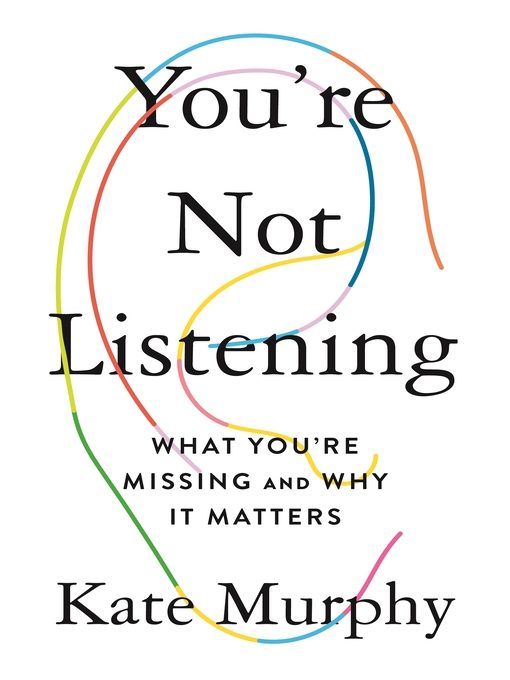
You're Not Listening
What You're Missing and Why It Matters
کتاب های مرتبط
- اطلاعات
- نقد و بررسی
- دیدگاه کاربران
نقد و بررسی

November 1, 2019
Journalist Murphy leaves no doubt about the importance of listening both for individuals and for society as a whole. She believes that listening well leads to understanding and wisdom, and enriches our experiences and interactions with others. Murphy reminds readers that active listening takes practice, focus, and is grounded in curiosity. She cites examples that show how listening is becoming a lost skill in today's distraction-filled and polarized world; evidence references previous research on the social and psychological aspects of listening and effective listening techniques as seen in interviews with criminal justice interrogators, improv comedians, writers, salespeople, priests, and even con artists. She covers the mechanics of hearing and shows how the multisensory nature of listening depends on nonverbal cues. VERDICT From communication researchers to general audiences, this informative and well-documented book will prod readers to reexamine the way they listen to others, individually and collectively, and to consider the many negative repercussions of not doing so.--Theresa Muraski, Univ. of Wisconsin-Stevens Point Lib.
Copyright 2019 Library Journal, LLC Used with permission.

December 15, 2019
A lively debut that asserts the power of closing our mouths and opening our ears. Houston-based journalist Murphy delves into the academic research on listening, which tends to be scantier than that on its noisier cousin, talking, and chronicles her interviews with those whose work revolves around hearing and paying attention, including a priest, a bartender, and a CIA agent. The author suggests that what might seem at first to be a passive activity is in fact an active, demanding one and a skill that can be learned with practice. At the basis of listening, Murphy maintains, is a sharp curiosity and the kind of openness that indicates the hearer has something to learn from the speaker. The author recommends thinking of active listening as a form of meditation. During a conversation, "you make yourself aware of and acknowledge distractions, then return to focus. But instead of focusing on your breathing or an image, you return your attention to the speaker." She points out that one of the primary obstacles to listening is the assumption that we know what someone is going to say, which means, unfortunately, that we're least likely to pay attention to the people closest to us, including spouses, children, and friends. In a chapter that is particularly helpful and relevant in our increasingly polarized world, Murphy offers suggestions on "Listening to Opposing Views," including recognizing the rather remarkable fact that when people with "staunch political views" are challenged on them, "their brains reacted as if they were being chased by a bear." On a practical level, the author also recognizes that it's not necessary to "listen to everyone until they run out of breath." While the narrative runs out of steam toward the end, repeating points that have already been made, it offers enough valuable advice and concrete suggestions to make it worth reading, even for those who already think they know how to listen. A valuable corrective for a talkative culture.
COPYRIGHT(2019) Kirkus Reviews, ALL RIGHTS RESERVED.

November 1, 2019
What do NPR's Terry Gross, LBJ, and con men have in common? They are all or were exceptionally talented at listening. In this celebratory compendium of the underappreciated art of truly hearing another's perspective, New York Times contributor Murphy outlines the characteristics of good listeners, presents research into the benefits and significant outcomes of listening, and makes a strong case for adjusting how we approach conversations in our professional and personal lives. With insights from skilled listeners, including a hostage negotiator, focus-group moderator, air-traffic controller, hairstylist, priest, and many others, along with her own experiences interviewing sources for articles, Murphy explores how we can better understand those around us. Too often, she says, we merely wait for our turn to talk in a conversation. With concrete advice and a wealth of guidelines, readers will come away with tips for a better approach, one that can be exceptionally useful, whether in the boardroom or at home. In an era dominated by incessant broadcasting and attention-seeking behavior on social media, listening offers both a salve and a solution.(Reprinted with permission of Booklist, copyright 2019, American Library Association.)

























دیدگاه کاربران